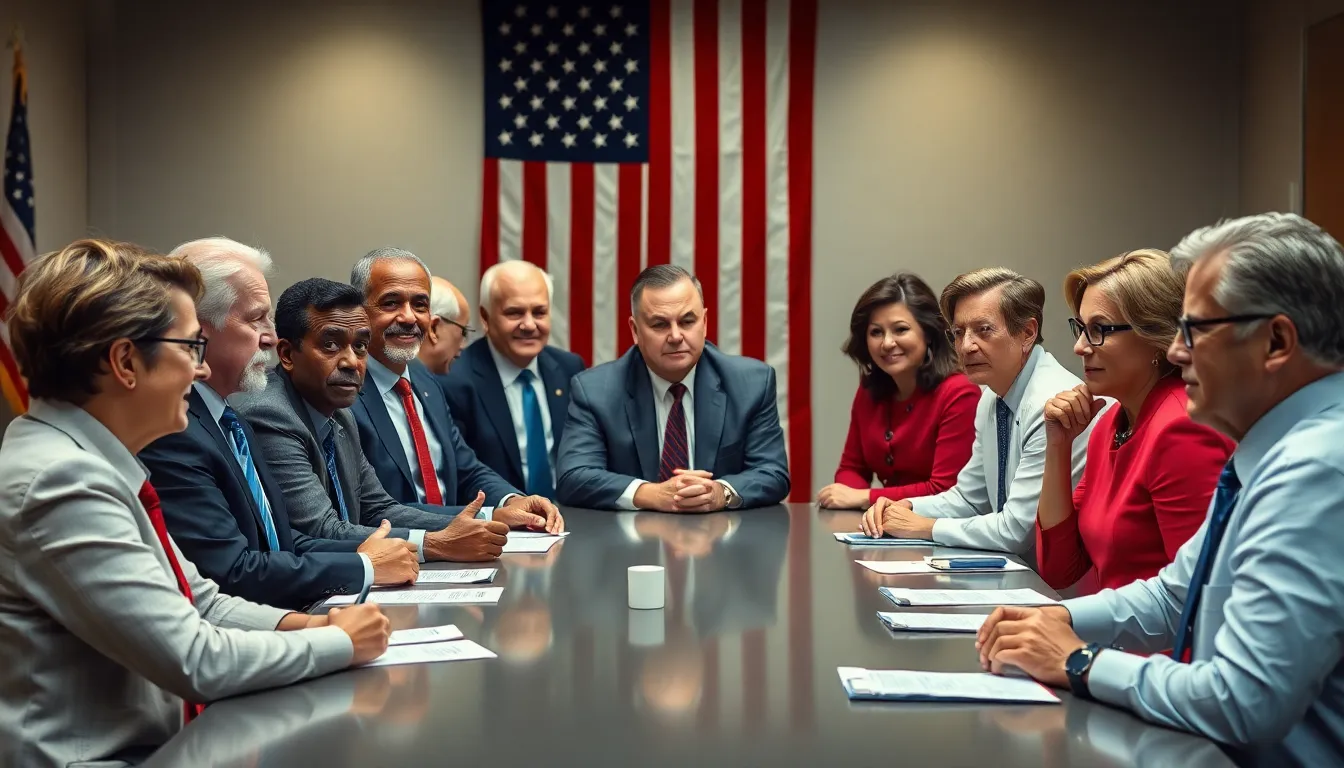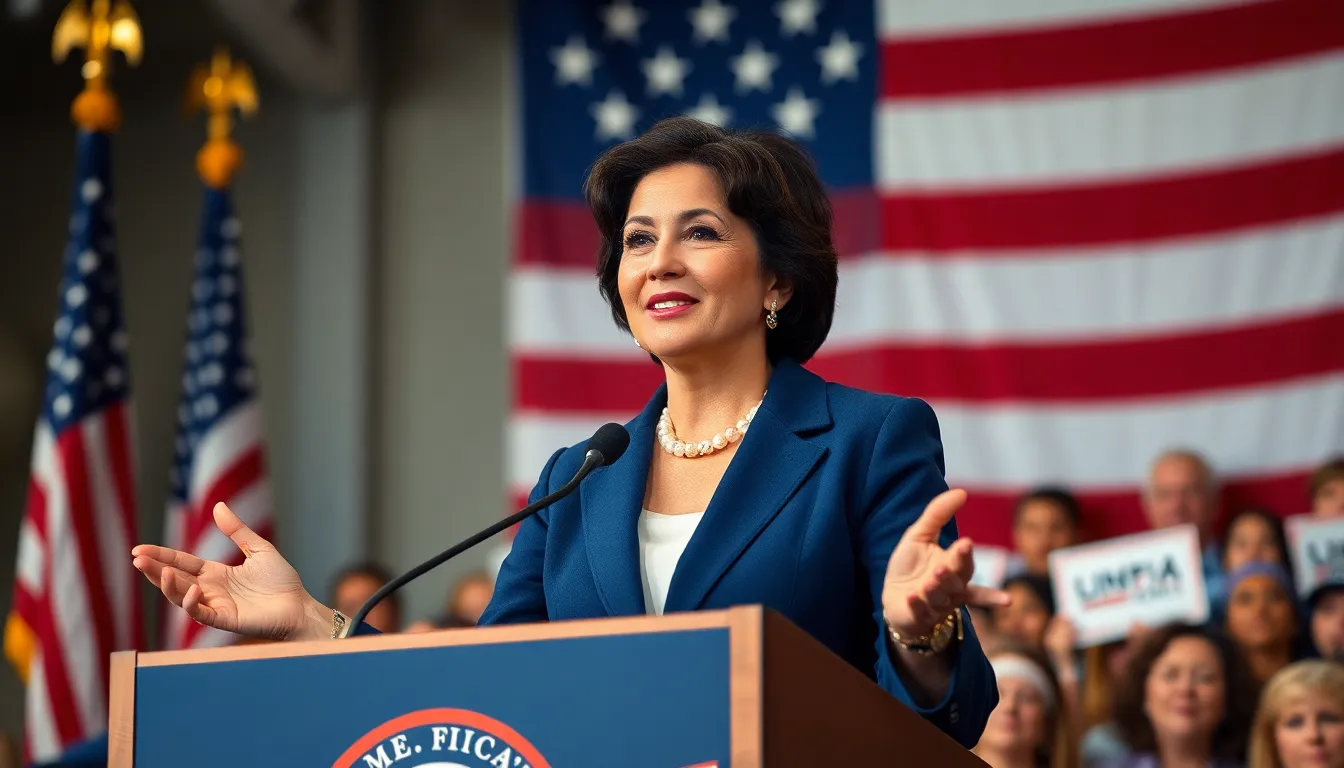Table of Contents
TogglePolitical leadership isn’t just about waving flags and giving speeches. It’s the art of balancing power, responsibility, and a dash of charisma, all while dodging the occasional shoe thrown by an angry voter. In a world where opinions are as diverse as the colors in a crayon box, effective leaders must navigate the turbulent waters of public sentiment with finesse and a sense of humor.
Understanding Political Leadership
Political leadership involves a multifaceted approach that extends beyond mere representation and rhetoric. Effective leaders balance authority and accountability while responding to societal expectations.
Definition and Importance
Political leadership refers to the ability to influence and guide individuals or groups within a political context. This skill set enables leaders to establish policies that align with public interests. Understanding this concept emphasizes the importance of vision, decision-making, and moral integrity in governance. Leaders who embody these qualities can inspire trust and loyalty among constituents. Effective political leadership promotes stability and progress within societies, fostering democratic processes and civic engagement.
Historical Context
Political leadership has evolved over centuries, shaped by cultures and societal changes. Ancient civilizations, such as those in Greece and Rome, showcased various leadership models emphasizing the role of citizens in governance. The emergence of democracies in the 18th and 19th centuries marked a significant shift, focusing on representative leadership and accountability. Events such as the American Revolution and the French Revolution highlighted the struggle for power and rights. Each era brought its challenges, necessitating leaders to adapt their strategies in response to changing public sentiments and historical circumstances.
Types of Political Leadership

Political leadership encompasses various styles, each significantly influencing governance and public perception.
Transformational Leaders
Transformational leaders inspire change by articulating a compelling vision, seeking to elevate the motivation of their followers. They prioritize innovation and foster an inclusive environment, encouraging participation from various societal sectors. These leaders often demonstrate strong ethical foundations, guiding their teams toward common goals. Nelson Mandela exemplifies this style, uniting a nation under a shared vision of equality. Through their ability to inspire and empower, transformational leaders leave a lasting impact on political landscapes.
Transactional Leaders
Transactional leaders operate on a clear system of rewards and penalties. Their focus lies in maintaining order and efficiently managing resources. By establishing defined roles, they ensure that everyone understands their responsibilities. These leaders thrive in stable environments with predictable outcomes, such as corporate settings or bureaucratic institutions. An example of a transactional leader includes Margaret Thatcher, who implemented policies that emphasized discipline and accountability. In her approach, the results-driven mindset facilitated significant governmental changes.
Authoritarian Leaders
Authoritarian leaders centralize power, demanding strict obedience from followers. They typically limit individual freedoms and impose regulations to maintain control. This leadership style relies on top-down decision-making, often circumventing public opinion. Historical examples, such as Adolf Hitler, reveal the significant consequences of authoritarian governance. These leaders may achieve rapid mobilization of resources, but their methods often lead to unrest and resistance. Balancing authority with public sentiment proves challenging for this model as leaders face pushback from dissident groups.
Characteristics of Effective Political Leaders
Effective political leaders display distinct characteristics that enable them to navigate complex political landscapes.
Vision and Strategy
Vision serves as the cornerstone of effective political leadership. Leaders articulate a compelling vision that inspires and mobilizes constituents around a common goal. Strategy complements this vision by providing a roadmap for achieving objectives. Leaders assess current resources and anticipate future challenges, aligning their strategies with both short-term and long-term goals. For instance, leaders like Barack Obama utilized a clear vision for change, enabling them to rally support for policy reforms. Establishing a strategic framework allows leaders to make informed decisions that address community needs and aspirations.
Communication Skills
Communication skills significantly enhance a political leader’s effectiveness. The ability to convey ideas clearly fosters understanding and engagement among constituents. Leaders employ various platforms, including speeches, social media, and town hall meetings, to reach diverse audiences. Successful leaders listen actively, ensuring that they address constituents’ concerns promptly. Franklin D. Roosevelt exemplified this by using radio broadcasts to connect with Americans during the Great Depression. Engaging communication not only informs but also builds trust, creating a supportive relationship between leaders and their followers.
Integrity and Ethics
Integrity stands as a fundamental characteristic of outstanding political leaders. Upholding ethical principles establishes credibility and trustworthiness, essential for effective governance. Leaders demonstrate accountability for their actions, inspiring confidence among constituents. Ethical leadership involves transparency in decision-making and a commitment to serving the public interest. Figures like Abraham Lincoln are revered for their strong moral compass and dedication to principles. Prioritizing integrity ensures that leaders can navigate challenges without compromising their values, ultimately enhancing their leadership impact.
The Role of Political Leadership in Society
Political leadership plays a crucial role in shaping society’s framework. Leaders take charge of guiding policies and influencing public sentiment.
Impact on Policy Making
Effective political leaders prioritize policy formulation based on their vision and constituents’ needs. They engage stakeholders throughout the process, ensuring diverse perspectives inform decision-making. Collaborative efforts result in policies that address relevant societal issues. For example, leaders may focus on healthcare reforms or education enhancements, striving to improve citizens’ lives while gaining public support. Strategic planning aligns with current challenges, promoting stability and growth. Furthermore, leaders’ decisions can lead to significant legislative changes that reflect public demands and ethical considerations.
Influence on Public Opinion
Public opinion significantly impacts political leadership, shaping a leader’s approach and decisions. Leaders who communicate effectively establish strong connections with their constituents. They may utilize various platforms to disseminate messages, encourage participation, and address concerns. When leaders demonstrate transparency, they foster trust and credibility among citizens. An informed public readily engages with political discourse, impacting leaders’ actions and policies. Examples illustrate how figures like Franklin D. Roosevelt harnessed media to influence perceptions during crises. Thus, political leaders navigate changing public sentiments while advocating for their agendas.
Challenges Facing Political Leaders Today
Political leaders encounter various challenges that shape their decision-making and effectiveness in governance.
Globalization and Its Effects
Globalization introduces complexities that impact political leadership. Economic interdependence among nations complicates domestic policy decisions. Leaders must navigate trade agreements while addressing local job concerns. Cultural exchanges influence public sentiments, often leading to conflicting values and priorities. For instance, while globalization can foster economic growth, it often results in inequality at home. Leaders are tasked with creating policies that balance international cooperation and local needs. This dual focus requires astute negotiation skills and a keen understanding of global dynamics.
Social Media and Communication
Social media reshapes how leaders communicate with constituents and the public. Platforms allow for instant messaging but introduce the risk of misinformation. Leaders must engage authentically to maintain credibility amidst rapid information dissemination. Engaging diverse audiences requires clear, concise messaging tailored for various platforms. Successful leaders use social media to foster direct interactions, enhancing community trust. For example, many engage followers through live streams, offering transparency and responsiveness. Balancing the benefits of social media with its challenges is crucial for effective political leadership today.
Crisis Management
Crisis management presents a significant test for political leaders. Unexpected events, such as public health emergencies or natural disasters, demand swift and effective responses. Leaders must coordinate resources, communicate clear guidelines, and reassure the public. Preparedness is vital, as hesitation can lead to public distrust. Developing contingency plans ensures leaders can act decisively when crises arise. For instance, during health crises, leaders focus on transparent communication and evidence-based policies to guide their actions. Effective crisis management fosters resilience within communities, highlighting political leadership’s role in stability and recovery.
Political leadership remains a dynamic and multifaceted endeavor that requires adaptability and resilience. As leaders navigate the complexities of modern governance they must balance authority with public sentiment while maintaining a clear vision. The evolving landscape of political challenges demands leaders who can inspire trust and foster collaboration among diverse groups.
By understanding various leadership styles and their implications leaders can better respond to the needs of their constituents. The importance of communication integrity and ethical decision-making cannot be overstated as these traits are essential for building lasting relationships with the public. Ultimately effective political leadership is about guiding society toward progress while remaining attuned to the voices of the people.




